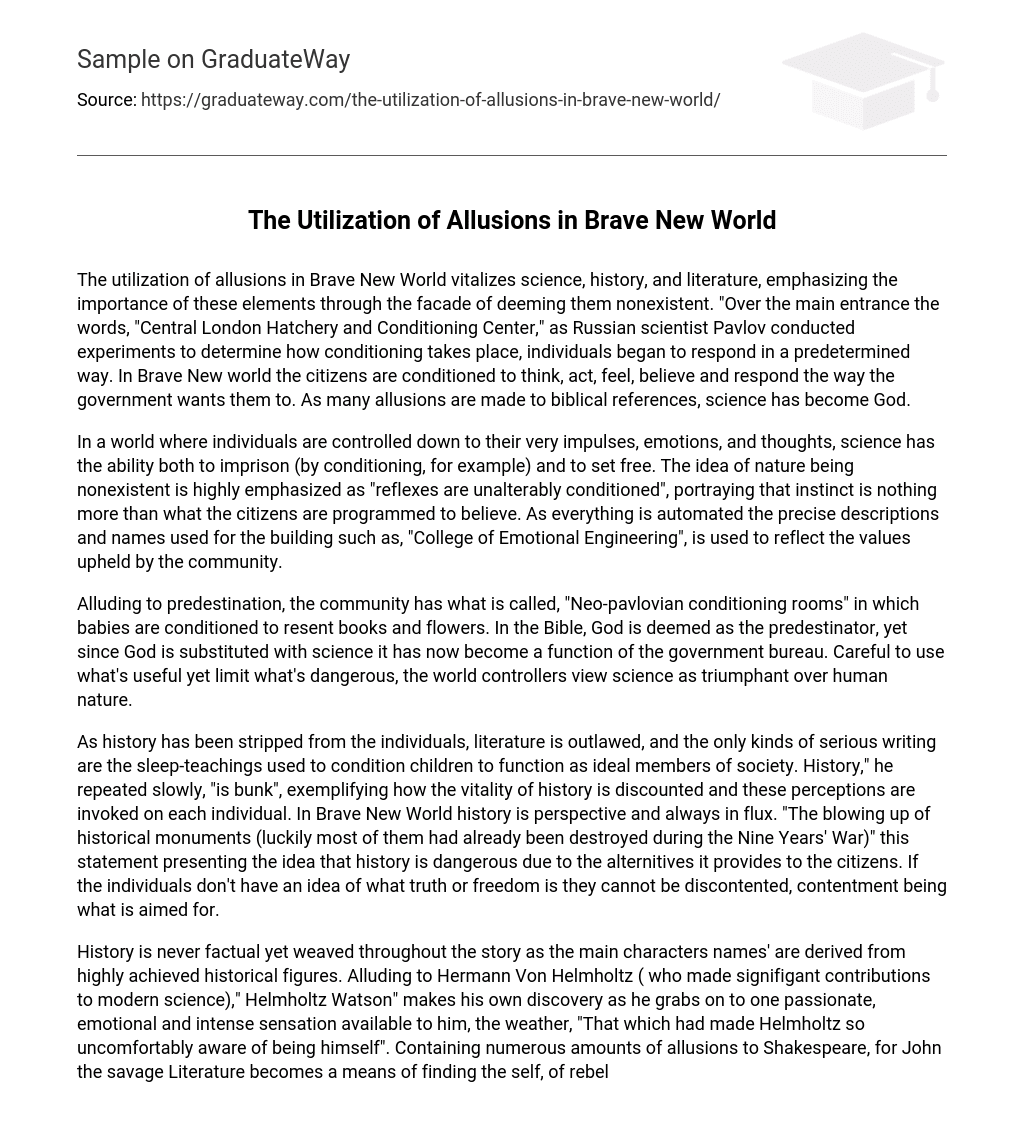The utilization of allusions in Brave New World vitalizes science, history, and literature, emphasizing the importance of these elements through the facade of deeming them nonexistent. “Over the main entrance the words, “Central London Hatchery and Conditioning Center,” as Russian scientist Pavlov conducted experiments to determine how conditioning takes place, individuals began to respond in a predetermined way. In Brave New world the citizens are conditioned to think, act, feel, believe and respond the way the government wants them to. As many allusions are made to biblical references, science has become God.
In a world where individuals are controlled down to their very impulses, emotions, and thoughts, science has the ability both to imprison (by conditioning, for example) and to set free. The idea of nature being nonexistent is highly emphasized as “reflexes are unalterably conditioned”, portraying that instinct is nothing more than what the citizens are programmed to believe. As everything is automated the precise descriptions and names used for the building such as, “College of Emotional Engineering”, is used to reflect the values upheld by the community.
Alluding to predestination, the community has what is called, “Neo-pavlovian conditioning rooms” in which babies are conditioned to resent books and flowers. In the Bible, God is deemed as the predestinator, yet since God is substituted with science it has now become a function of the government bureau. Careful to use what’s useful yet limit what’s dangerous, the world controllers view science as triumphant over human nature.
As history has been stripped from the individuals, literature is outlawed, and the only kinds of serious writing are the sleep-teachings used to condition children to function as ideal members of society. History,” he repeated slowly, “is bunk”, exemplifying how the vitality of history is discounted and these perceptions are invoked on each individual. In Brave New World history is perspective and always in flux. “The blowing up of historical monuments (luckily most of them had already been destroyed during the Nine Years’ War)” this statement presenting the idea that history is dangerous due to the alternitives it provides to the citizens. If the individuals don’t have an idea of what truth or freedom is they cannot be discontented, contentment being what is aimed for.
History is never factual yet weaved throughout the story as the main characters names’ are derived from highly achieved historical figures. Alluding to Hermann Von Helmholtz ( who made signifigant contributions to modern science),” Helmholtz Watson” makes his own discovery as he grabs on to one passionate, emotional and intense sensation available to him, the weather, “That which had made Helmholtz so uncomfortably aware of being himself”. Containing numerous amounts of allusions to Shakespeare, for John the savage Literature becomes a means of finding the self, of rebelling against conformity, and of seeking both truth and beauty.
Literature is deemed as a threat, the library is limited to contain “only books of reference”, citizens are not encouraged “to indulge in any solitary amusements”, such as reading. Because reading is all about self examination and discovery, it is not allowed as the idea is to keep individuals “safe from books and botany all their lives. ” . Despising even the idea of soma, John quotes Shakespeare as he states, ” eternity was in our lips and eyes” exemplifying his disbelief that “soma is a little piece of eternity”.
Though at first intrigued by this “brave new world” John begins to realize that it was not as significant as he had thought. Alluding to Shakespeare’s, The Temptest, stating, “O brave new world! ” It was a challenge, a command. ” As the allusions provide insight into the novel as well as establish a fundamental basis for the work, Individuals seek to understand their own individuality through isolation and self-exploration as each character is defined by what they allude to.





